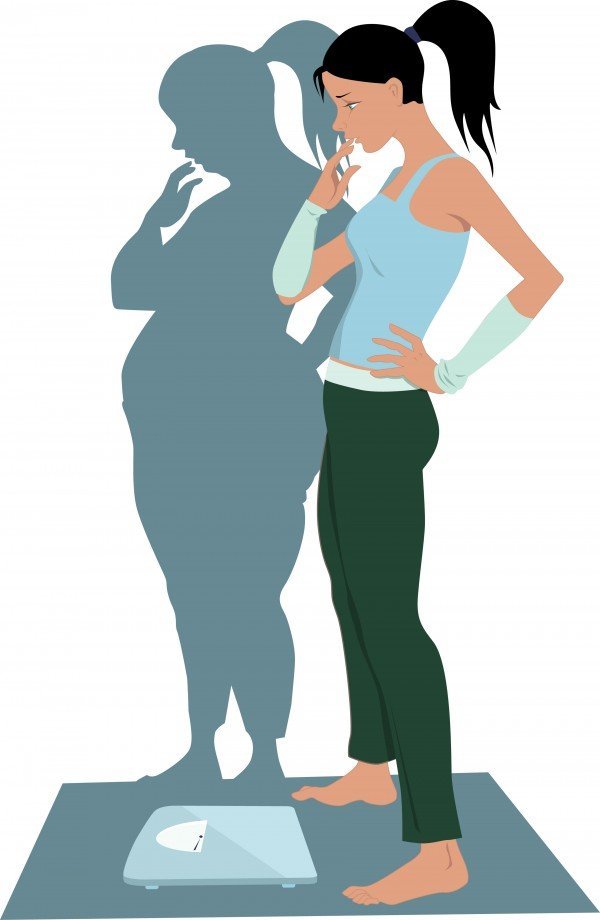I know.
This topic is a bit more serious than a lot of other things I share on this blog, but I feel very strongly that it needs to be discussed. If you feel like you might be struggling with an eating disorder, please don?t think I am here to shame you. Nope ? I have been there in my own life. For many years I struggled with a combination of eating disorders, and I know this is something I will forever need to keep in mind to help my recovery for the rest of my life.
So, if you are reading this, and you are struggling, please understand I simply don?t want you to hurt like I hurt. I?m here to help you identify if you might need help, or if someone you know does. I?m here to help save you from the painful battle that I endured.
Here are a couple of staggering statistics:
? Up to 24 million people (male and female) of all ages suffer from an eating disorder in the U.S.
? Only 1 in 10 people suffering from an eating disorder receive treatment.
That last statistic is pretty scary, especially since eating disorders can cause major health problems and even death. Maybe you?re one of the millions who needs help, or maybe you know someone who suffers from an eating disorder. Hopefully this discussion will give you some helpful tools in either case.
An eating disorder, to put it plainly, is an illness that stems from unhealthy behaviors associated with food and weight. These unhealthy habits could include overeating, starving, vomiting, and others.
Let?s face it. There?s tremendous pressure in today?s society to be magazine-cover thin. Even though we realize many of these photos are altered and airbrushed, we still see the thin person on the cover, who looks soooo happy, and we want to be that person. And some people are willing to do anything to become that person, including behaviors that lead to eating disorders.
Eating disorders are categorized into three types:
- Anorexia Nervosa: With this illness, a person has a fear of gaining weight and usually becomes dangerously thin. It mostly affects teen and young adult girls. Those who suffer from anorexia are very critical of themselves, obsess over food, exercise excessively, take diet pills, eat too little, and/or see themselves as fat.
- Bulimia Nervosa: This disease is characterized by bingeing, followed by purging (through vomiting and/or laxative abuse), and also affects mostly teen and young adult girls. Those suffering from this disorder are often a normal weight or slightly overweight, feel out of control, exercise excessively, are afraid of gaining weight, experience depression and anxiety, are more susceptible to substance abuse, and/or have a somewhat distorted body image.
- Binge-eating disorder: Unlike anorexia and bulimia, people suffering from this disorder don?t try to exercise or purge to compensate for the excessive amounts of food they eat. Their body weight ranges from normal to obese, and they often eat alone, feel out of control, and/or can experience feelings of guilt, shame, and depression. This disorder affects mostly middle-aged men and women, and can be triggered by stress, anxiety, and/or boredom. Most of the individuals we work with on Extreme Weight Loss struggle with this disorder.
The most common treatment for an eating disorder is therapy ? learning about yourself and how to find balance and control with food. However, other treatments can involve medication, and sometimes even hospitalization.
If you or someone you know is affected by an eating disorder, here are some important things to remember:
- Never compare yourself to others. We all have different bone structures, genes, and cultures. What is a healthy weight for one person is not necessarily a healthy weight for another. I?m quite petite, so a healthy weight for me is not a healthy weight for a person who?s much taller with a not-quite-so-petite bone structure. But I must admit, this was very difficult for me in my teen years, and even into early adulthood. PS ? this is one of the reasons I CrossFit and train for performance. The feeling of ?Skinny? doesn?t hold a candle to the feeling of ?Strong?. I?m hooked ?
- Don?t let the number on the scale define you. It?s just a number that?s affected by all the things listed above. Instead of working toward a certain number on the scale, make being healthy your main goal. I know. Sometimes that number we see on the scale can either make our day or send us into a mini-meltdown. As women, our weight can fluctuate by a few pounds?overnight?depending on what time of the month it is, and also on the types of foods we ate yesterday. Depend, instead, on how your clothes fit and how you truly feel. Once again, strength training and Crossfit helped me get over this number and focus on health.
- Find balance in your life between getting healthy and living life. Fixating too much on one thing is not healthy and in no way leads to a balanced and happy life. While Chris and I love to work out, we also know there are many other things in life that are just as, or more, important. We work together to make sure we create room in our jam-packed schedules for those things we feel passionate about. Let?s face it?you never find time. You must create a time for balance. Allowing ourselves to focus on these other more important things allows us to see fulfillment and happiness in areas outside of ourselves.
- Realize that falling is not failing. Failure happens when we don?t get back up and try again after we fall. Learn from your falls and you?ll become a much stronger person. If you?ve watched our show, you?ve seen our contestants experience this over and over again. How are we supposed to learn how to succeed if we never fall?! Anyone (including myself) that has been down (or is going down) the road to recovery from an eating disorder knows that it isn?t easy. We fall. We mess up. Sometimes we relapse. We are human. For anyone that doesn?t struggle during recovery?all I can say is you must be super-human ?. But remember that falling is okay. It doesn?t mean we fail. Like I said, we only fail when we choose not to get back up.
- Build a support system. Find those whose opinions matter to you and who love you for the person you are right now. They will bend over backwards to help you through this struggle?I promise! My biggest supporters were my late father and my mom (in addition to therapists). Find your supporters ? maybe a best friend, a co-worker, a sibling?
- Get help. There is nothing weak about getting help when you need it. In fact, asking for help is a definite sign of strength! This is such a hard step for most people. There are many organizations that specialize in helping those with eating disorders, and one we?ve featured on our show is Shades of Hope in Dallas, Texas. You can also go to the National Eating Disorders Association?s website for more helpful information.
While eating disorders are very serious illnesses, they can be overcome, and those who suffer from them can go on to lead normal, healthy, and happy lives. It?s all about finding and becoming the best?and healthiest?person you can be!
And please check out this other post on my blog for more information on my journey to overcome my own eating disorder.
*Source of basic information about eating disorders: mayoclinic.com



64 Responses
My eating disorder is a roller coaster ride- or a vicious cycle. I haven’t decided yet. I consider myself to be very much like an addict in recovery. Unfortunately I have had many set backs over the last 12 years. I will “relapse” and start undereating or restricting calories in a major way. I have sustained permanent damage from anorexia nervosa. It once got so bad I developed necrotizing gingivitis because my body chemistry was so messed up from starving. (That was about 8 years ago) I have calcium and iron problems from on again off again malnutrition. I haven’t succumbed to the anorexia completely in about 6 years because I have a family including 3 young children who need me to be healthy- I rely on that to keep me in the proper mindset. I want to teach my 3 young girls to have an appropriate relationship with food. I want to teach them they should exercise to be strong instead of focusing on whatever imperfections they might ever see. I want them to love their bodies for what they’re capable of doing instead of criticizing every inch. It’s my sincere hope that all of you who posted here can recover and not feel helpless- we are here for you- you are not alone- *hugs* Chris and Heidi, you are amazing! You’ve inspired me to eat well for my body and exercise daily- it helps so much! Thank you for just being you!
Thank you Heidi for this blog. Also, Alyssa’s story was amazing! It so hit home. When I was a teenager I had a severe eating disorder. I was bulimic and almost died as I threw up so much that I tore my esaphogus and almost bled to death. I was hospitalized for over 3 months and got down to only 87 lbs. Yes I did get help but now 30 some years later I am back to square one. I am over 210 lbs and am only 5 feet tall. My biggest struggle is finding that balance between the eating and exercising and putting myself first. This show today really helped me refocus!! Thank you so much.
Short film about ED ana
http://www.youtube.com/watch?v=LgWa44BpZd4
Growing up as a young adult, I often would binge eat. However, now in the last two weeks I have gone to the opposite of restricting calories. I hate how I know what it does to my body physically. However, mentally it’s so hard to stop. I feel so lost and out of control. Now with the holidays, I’m even more anxious. I’ve been ashamed if myself.
I am a foodaholic I struggle daily I have a hard time stopping myself and I hate myself for it! I have always been the big funny girl when inside I cry nonstop from a broken heart that you cannot see.
Thank you for sharing about this. You are very inspirational for those of us who have struggled and currently struggle with disordered eating.
I have no one in my life to help me with my eating disorder. I’m 51 years old and can’t find the way out. I don’t have a lot of money to get the help that I need and I just don’t know where to turn. People talk about eating disorders but no one really gives you information on how to get the help that you need if you’re not wealthy. I don’t have a mom or dad or friends to help me with this.
I have been suffering with an ED for just over a year now. I have already done inpatient at a clinic and had a few trips to the emergency room for heart troubles. It eventually lead to severe depression and attempted suicide. Despite everything, I am still suffering. Therapy just isn’t helping me so far. My support system is so limited…I am ashamed of myself. In fact, I hate myself every day. I want to be thin AND healthy. I can’t seem to find a happy medium though. Eating disorders are scary and so, so dangerous.
I so desperately wish I could learn to be healthy and stay that way.
Thank you though, Heidi, for shining some light on this delicate subject.
Jacqui- Thank you for mentioning ED-NOS. More than half of patients diagnosed with an eating disorder have ED-NOS (in part because of the rigid DSM-IV criteria for Anorexia and Bulimia) and it can be just as dangerous.
I have been struggling with ED-NOS for the past couple of years and I’m currently considering residential treatment to try and get this under control. It’s an extremely hard and exhausting thing to deal with and coupled with shame and the common assumption that an eating disorder is a “choice” can make one feel incredibly alone in this battle. Thank you for talking about this.
I had to write as this is a topic that plagued me for close to half of my life. The good news? I got help & was finally able to get better. The reality check? It took a very long time and required more faith and patience from myself, my family & my friends than I can sometimes bare to comprehend. I was hospitalized, and it stayed with me. I was pregnant…three times…and it stayed with me. I went to therapy, took anti-depressants, worked with nutritionists, threw out my scale, bought a new one, and so it went…on & on. In the middle of the summer when everyone was wearing shorts & bikinis, I wore long pants & long sleeve shirts, ashamed because I was not a twig.
It took a small village to help me get better. One solid therapist. A very patient husband. Two anxious parents. Many true friends. And most importantly, three young children who needed a mother who was present and able to be there for them. I am thankful every single day that these struggles are things of the past for me. I echo what you wrote, and encourage anyone struggling with food to reach out to someone…anyone…for help.
Never give up.